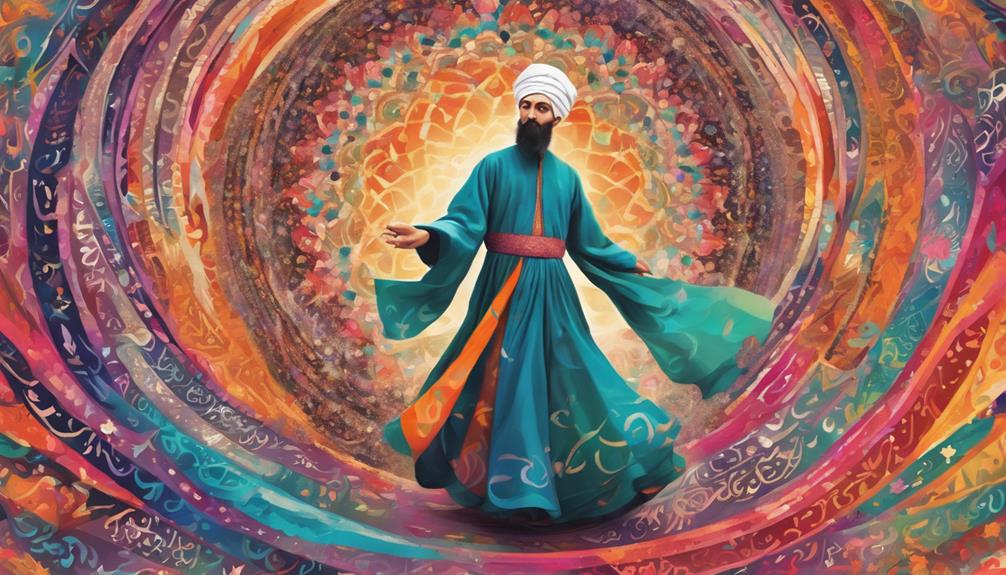As you delve into Sufi poetry, you'll commence on a transformative journey of self-discovery, where the boundaries of the ego are transcended and the whispers of the Divine Beloved beckon you towards a longing for union. The poet's metaphors will bridge human experience and the transcendent, conveying an urgency for spiritual fulfillment. Through Sufi verse, you'll be initiated into the mysteries of the sacred, and the ache of longing will catalyze a deeper awakening. And as you surrender to the rhythm of these sacred words, you'll find yourself drawn closer to the hidden truth, awaiting revelation.
The Sufi Path to Enlightenment

As you begin your journey on the Sufi path to enlightenment, you'll discover that it's a profoundly personal and intimate exploration, one that requires embracing a nuanced understanding of the self and the divine. This path is not for the faint of heart, as it demands a willingness to confront and transcend the limitations of the ego. To traverse this path, you'll need to cultivate a range of devotional practices, such as meditation, prayer, and contemplation, which will help you attune yourself to the whispers of the divine. These spiritual disciplines will allow you to quiet the mind, still the heart, and awaken to the presence of the divine within. As you deepen your practice, you'll begin to experience a profound sense of unity and interconnectedness with all of existence. The Sufi path is not a destination, but a journey of continuous growth, transformation, and self-discovery. Through dedication and perseverance, you'll come to realize that the boundaries between the self and the divine are but an illusion, and that true enlightenment lies in embracing this unity.
Whispers of the Divine Beloved

In the stillness of the heart, where the din of the ego's chatter subsides, you'll begin to discern the whispers of the Divine Beloved, a gentle yet insistent presence that beckons you closer to the threshold of unity. As you surrender to the Sacred Silence, you'll start to sense the subtle stirrings of Divine Intimacy, a longing that transcends the boundaries of the self. It's here, in the quiet recesses of your being, that you'll discover the whispers of the Divine Beloved, a soft murmur that awakens your soul to the possibility of union.
As you attune yourself to this gentle voice, you'll begin to realize that the Divine Beloved is not some distant, unapproachable entity, but an intimate companion that dwells within. The whispers of the Beloved are an invitation to surrender, to let go of the need for control and allow yourself to be enveloped by the infinite. It's a call to abandon the pretenses of the ego and surrender to the tender embrace of the Divine. In this sacred space, you'll find that the whispers of the Beloved grow louder, guiding you toward the ultimate goal of Sufi poetry: the ecstatic union of lover and Beloved.
Metaphors of Spiritual Longing

Through the masterful use of metaphors, Sufi poets convey the intensity of spiritual longing, likening the soul's yearning for the Divine to a parched traveler's desperate search for an oasis in the desert of existence. As you explore the domain of Sufi poetry, you'll discover that these metaphors serve as a bridge between the human experience and the transcendent sphere. They evoke a sense of heartfelt yearning, a deep-seated desire to reunite with the Beloved.
The Sufi poets' use of metaphors allows you to experience the longing for the Divine as a palpable, almost physical ache. You're invited to imagine the Celestial whispers that echo within the chambers of the heart, beckoning you to embark on a journey of self-discovery and spiritual growth. Through these metaphors, the poets masterfully convey the urgency and desperation that accompany the search for spiritual fulfillment. As you immerse yourself in these poetic expressions, you'll begin to grasp the depth of human longing for transcendence and the profound impact it has on the human experience.
The Poetics of Ecstasy

You're about to set off on a journey where the boundaries of language are pushed to their limits, as Sufi poets employ the poetics of ecstasy to convey the uncontainable, overwhelming experience of divine union. In this domain, words are mere vessels for the inexpressible, and the poet's task is to convey the intensity of sacred intimacy. The Sufi poet's language is imbued with divine madness, a state of being possessed by the divine, where the rational faculties are transcended, and the poet becomes a mere conduit for the divine voice.
Through the poetics of ecstasy, Sufi poets create a language that is at once intimate and expansive, conveying the contradictions of divine love. This is a space where the poet's 'I' is dissolved, and the boundaries between the self and the divine are blurred. The poet's words become a form of mystical communion, where the reader is invited to participate in the sacred intimacy of the divine encounter. In this domain, language is no longer a mere medium of communication but a threshold to the divine, where the reader is initiated into the mysteries of the sacred.
Union Through Separation

As the Sufi poet journeys through the paradoxical world of union through separation, they discover that the ache of longing can be a catalyst for spiritual awakening. In this domain, you, the solitary pilgrim, venture on a path of self-discovery, where the yearning for divine unity intensifies as the distance between you and the Beloved seems to widen. This apparent dichotomy is, in reality, a subtle illusion, for in the depths of your soul, you're drawn closer to the divine presence. The pain of separation becomes a transformative force, dissolving the boundaries of the ego, allowing you to transcend the limitations of the self. Paradoxical unity emerges, where the seeming separation is revealed as an illusion, and the divine presence is felt in the very core of your being. Through this mystical alchemy, the Sufi poet transforms the anguish of longing into a profound awareness of the interconnectedness of all existence.
Mystical Imagery and Symbolism

In the domain of Sufi poetry, mystical imagery and symbolism unfold like a tapestry, woven from the threads of the poet's inner experiences, where the rose symbolizes the Beloved, the nightingale embodies the soul's longing, and the wine cup represents the intoxicating union with the divine. As you explore the world of Sufi verse, you'll discover cosmic landscapes that evoke the infinite expanse of the universe, where the poet's soul soars like a bird on wing. Sacred gardens, too, are a recurring motif, representing the inner sanctum of the soul, where the divine and the human intersect. These symbolic landscapes invite you to partake in a mystical journey, where the boundaries of the self are transcended, and the seeker merges with the divine. Through these rich, evocative images, the Sufi poet whispers secrets of the universe, guiding you toward the ultimate goal: union with the Beloved. As you immerse yourself in this mystical world, the symbols and imagery will begin to reveal their secrets, and the mysteries of the universe will slowly unfold before you.
The Sufi Masters' Legacy

Through the revered Sufi masters' sublime teachings, which have filtered down through the centuries, you'll explore a rich tapestry of wisdom, woven from the threads of their profound spiritual experiences. As you investigate their mystical writings, you'll uncover the essence of Sufi philosophy, which forms the core of Mystical Islam. The Sufi masters' legacy is a confirmation of the transformative power of love, compassion, and self-purification. Their teachings, infused with the fragrance of divine love, guide you on a journey of self-discovery and spiritual growth. You'll find that their poetry and prose are imbued with a deep understanding of the human condition, offering a profound exploration of the human heart and its relationship with the divine. As you immerse yourself in their works, you'll begin to grasp the intricacies of Sufi philosophy, which seeks to unite the individual with the ultimate reality. Through their legacy, you'll discover a profound understanding of the mysteries of the universe and the secrets of the human soul.
In Search of the Hidden Truth

Your quest for the hidden truth begins with a exploration of the depths of your own soul, where the whispers of the divine await discovery. As you commence on this sacred pilgrimage, you'll find that Sufi poetry serves as a trusted guide, illuminating the path to self-discovery and spiritual awakening. The verses of the great Sufi poets, such as Rumi and Attar, offer a profound exploration of the human experience, inviting you to confront the mysteries of the universe and the secrets of your own heart.
As you dig deeper into the domain of Sufi poetry, you'll come to realize that the search for the hidden truth is, fundamentally, a cosmic quest. It's a journey that transcends the boundaries of space and time, beckoning you to surrender to the infinite and the unknown. Through the poetic expressions of the Sufi masters, you'll gain insight into the mystical dimensions of existence, and the hidden patterns that govern the universe. By embracing this sacred journey, you'll come to understand that the search for the hidden truth is, ultimately, a search for the divine within yourself.
Verse as a Spiritual Practice

As you explore the world of Sufi poetry, you'll discover that the rhythmic cadence of verse can subtly attune your inner self to the harmonies of the universe. This sacred resonance awakens a deeper sense of connection, bridging the divide between the human and divine domains. As you immerse yourself in the poetic tradition, you'll find that verse becomes a spiritual practice, a means of transcending the mundane and accessing the mystical. The repetition of sacred phrases, the cadence of the words, and the silence between them all converge to create a profound sense of poetic devotion. In this state, the boundaries of the self dissolve, and the seeker merges with the divine. The sacred silence that ensues is not an absence of sound, but a presence that permeates every fiber of being. As you surrender to the rhythm of Sufi verse, you'll find that the distinction between the poet, the poem, and the divine begins to blur, and the essence of unity reveals itself.
Frequently Asked Questions
Can Anyone Write Sufi Poetry, or Is It Only for Sufi Masters?
As you ponder the possibility of writing Sufi poetry, you wonder if it's reserved for the mystic elite. While it's true that Sufi masters have honed their craft through rigorous literary apprenticeship, poetic intuition can be cultivated by anyone. With dedication and sensitivity, you too can tap into the mystical domain, allowing your words to become vessels for the divine.
How Does Sufi Poetry Differ From Other Forms of Mystical Poetry?
As you explore the world of mystical poetry, you'll discover that Sufi poetry stands apart from other forms. It's not just the lyrical mysticism that sets it apart, but the unique blend of mystical symbolism and spiritual longing. Unlike other forms, Sufi poetry employs symbolism that's both intimate and universal, speaking directly to the soul. This distinctive approach creates a sense of oneness, dissolving boundaries between the self and the divine.
Are Sufi Poems Meant to Be Recited Aloud or Read Silently?
As you explore the world of mystical verse, you may wonder if Sufi poems are meant to be recited aloud or read silently. The answer lies in the intention of the poet. These verses are often crafted to be spoken, leveraging vocal resonance to evoke a sense of sonic intimacy between the reader, the poet, and the divine. When recited aloud, the words take on a new dimension, transcending the page to envelop the listener in a shared experience of spiritual longing.
Can Sufi Poetry Be Used as a Form of Meditation or Prayer?
As you explore the world of spiritual exploration, you may wonder if poetry can become a form of meditation or prayer. Indeed, it can. Through mindful reflection and spiritual contemplation, you can harness the power of words to quiet the mind and awaken the soul. By immersing yourself in the rhythmic cadence and profound symbolism, you can transcend the mundane and connect with the divine.
Are Sufi Poems Only About Spiritual Longing, or Do They Address Other Themes?
As you explore the world of Sufi poetry, you'll find it's not just a one-trick pony, skirting around the issue when it comes to themes. While spiritual longing is a dominant force, these poems also tackle cultural commentary, offering astute observations on the human experience. Emotional exploration is another hallmark, with poets plumbing the depths of love, loss, and the human condition. It's a rich tapestry, woven from diverse threads, and one that will leave you enriched and enlightened.


